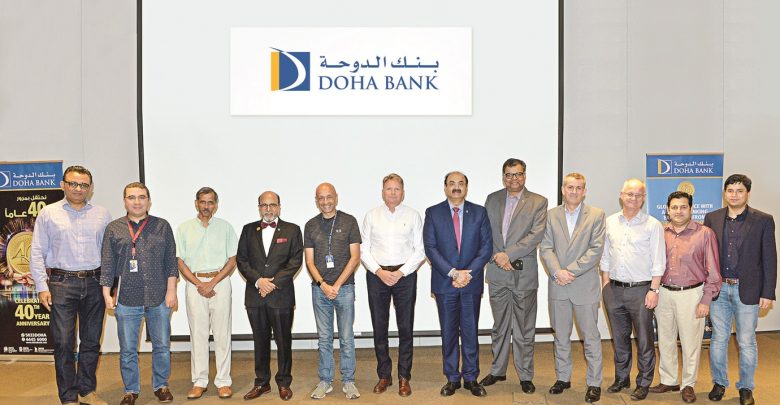
Doha Bank hosts session on Artificial Intelligence
بنك الدوحة يستضيف جلسة حول الذكاء الاصطناعي
DOHA: Doha Bank hosted a session on Artificial Intelligence which was presented by Dr. Ganesh Mani, who is an adjunct Faculty of Carnegie Mellon University. The event held at the bank’s Head office was well attended by Senior management of Doha Bank.
Considered as a thought leader in the areas of AI / FinTech, Dr Mani has helped many start-ups and large institutions with data-informed innovation. He co-founded and eventually sold one of the earliest AI/ML-based investment management boutiques into SSgA, nucleating the Advanced Research Center there, which served as the knowledge-locus for managing multi-billion dollar portfolios
Addressing the event, Doha Bank CEO Dr. R. Seetharaman highlighted the transformational trends in technology. “Various industries are getting redefined, the health sector can be reimagined, the work space is undergoing changes, robotics and artificial intelligence are going to play important roles and the customer will be more empowered in the digital environment. Banks need to manage the change by redefining their business models and to manage various stake holders such as customers, regulator and shareholders”, he said.
On the transformation happening in Doha Bank,Dr Seetharaman said the business model innovation is in the process. “ It is often necessary to generate value from a radical product innovation. Agility, simply we develop rapidly with continuous delivery of useful software. Successful innovation focuses on making customers’ lives easier, better and, ideally, more enjoyable. We are already seeing innovative financial services such as Cloud-native architectures driving innovation in data science, IoT, and other areas which will provide both the threat of us being disrupted and the opportunity for innovation.”
Dr. Mani initiated his presentation by sharing a perspective on AI and how it has evolved in the various use cases. He cited a very interesting example of self-driven car where the free turn is an issue but AI developers solve by ensuring the car goes around the block and has to only take turns in one direction. He talked about the fundamentals of AI, which require data, domain expertise and tools.
Dr Mani gave the example of the Chinese market, where data is more easily accessible due to relaxed data protection laws and therefore they have a big advantage in their ability to develop robust AI models based on extensive data sets. He also shared the case study of the team from Finland who have created a product based on game theory which can consistently beat the poker machine. The poker, especially no limit Texas Holden has numerous permutations and anticipating this and beating it is a remarkable achievement. He also discussed the economics and the fact that there is a high likelihood of US trending towards a negative interest rate environment and with all the other converging data points the models suggest a potential economic recession in the next 12-18 months. He led a very interactive session sharing his perspective across a wide array of topics and questions that the audience engaged on from AI based advisory platforms to AI based Lending and Insurance solutions.
استضاف بنك الدوحة، الأحد الماضي، جلسة حول الذكاء الاصطناعي، قدّمها الدكتور غانيش ماني الأستاذ المساعد في المكتب الرئيسي لجامعة كارنيجي ميلون، ورائد فكري في مجالات الذكاء الاصطناعي والتكنولوجيا المالية، يُضاف إلى ذلك مساعدته عديداً من الشركات الناشئة والمؤسسات الضخمة في مجال الابتكار القائم على استخدام البيانات.
كما أسّس وباع إحدى أكبر شركات إدارة الاستثمار القائمة على الذكاء الاصطناعي/ تعلّم الآلات لشركة «أس.أس.جي.أيه»، التي أسهمت في تأسيس مركز الأبحاث المتقدمة هناك وكانت بمنزلة مركز المعرفة لإدارة
محافظ بمليارات الدولارات. هذا، وقد حضر الجلسة مسؤولون في الإدارة التنفيذية ببنك الدوحة.
وخلال الجلسة، تحدّث الدكتور ر. سيتارامان عن اتجاهات التحوّل على صعيد التكنولوجيا قائلاً: «تشهد عديد من القطاعات تغييراً في مضمون عملها؛ فبالإمكان مثلاً تغيير مفهوم العمل بالقطاع الصحي؛ إذ إن التغييرات جارية على قدم وساق في فضاء العمل، حيث ستتولى الروبوتات والذكاء الاصطناعي دوراً أساسياً فيها، وسيصبح العميل أكثر دراية ووعياً من خلال البيئة الرقمية. لذلك، يتعين على البنوك كافة تبنّي هذه التطورات والتغييرات، من خلال إعادة صياغة نماذج أعمالها وإدارة مصالح الأطراف المعنية كالعملاء والجهات التنظيمية والمساهمين. فمحور تركيز العملاء هو المعلومات وليس الموقع. ولغرض تبنّي التغييرات الرقمية، فإنه يتعين تطبيقها بسرعة، وإلا لن يكون هناك فرصة للاستمرار».
تحولات
كما تحدّث الدكتور ر. سيتارامان عن التحولات الرقمية في بنك الدوحة قائلاً: «يجري العمل حالياً على تطوير نماذج أعمال مختلفة كلياً تعود بالنفع على العملاء والشركات على حد سواء، من خلال توفير منتجات مبتكرة تعمل على تقديم قيمة مضافة. كما أننا نسعى إلى مواكبة التطورات السريعة والمستمرة للتكنولوجيا، من خلال ابتكار منتجات تساهم في جعل حياة العملاء أسهل وأفضل وأكثر متعة. وبدأنا نلمس بالفعل كيف أن الخدمات المالية المبتكرة كهياكل التطبيقات السحابية تحفّز الابتكار في علم البيانات وإنترنت الأشياء، وغيرها كثير التي تشكّل فرصاً وتهديدات على حد سواء».
وقد بدأ الدكتور غانيش ماني عرضه التقديمي من خلال تبادل وجهات النظر حول تكنولوجيا الذكاء الاصطناعي وتطوّرها في الاستخدامات المختلفة. وقد ضرب مثالاً مثيراً للاهتمام عن السيارة ذاتية القيادة، كما تحدّث عن أساسيات الذكاء الاصطناعي، التي تتطلب كماً هائلاً من البيانات، وخبرات وأدوات متخصصة. وضرب مثالاً بالسوق الصيني، حيث يمكن الوصول إلى البيانات بسهولة أكبر بسبب قوانين حماية البيانات المريحة، ومن ثم فهي تتمتع بميزة كبيرة في قدرتها على تطوير نماذج قوية من الذكاء الاصطناعي تستند إلى مجموعات شاملة من البيانات.
وتضمّن عرضه الحديث عن موضوعات أخرى عديدة؛ مثل منصات الاستشارات القائمة على الذكاء الاصطناعي، والإقراض القائم على الاقتصاد الاصطناعي وحلول التأمين، وكان هناك تفاعل كبير مع الحضور في مناقشة تلك الموضوعات كافة.



